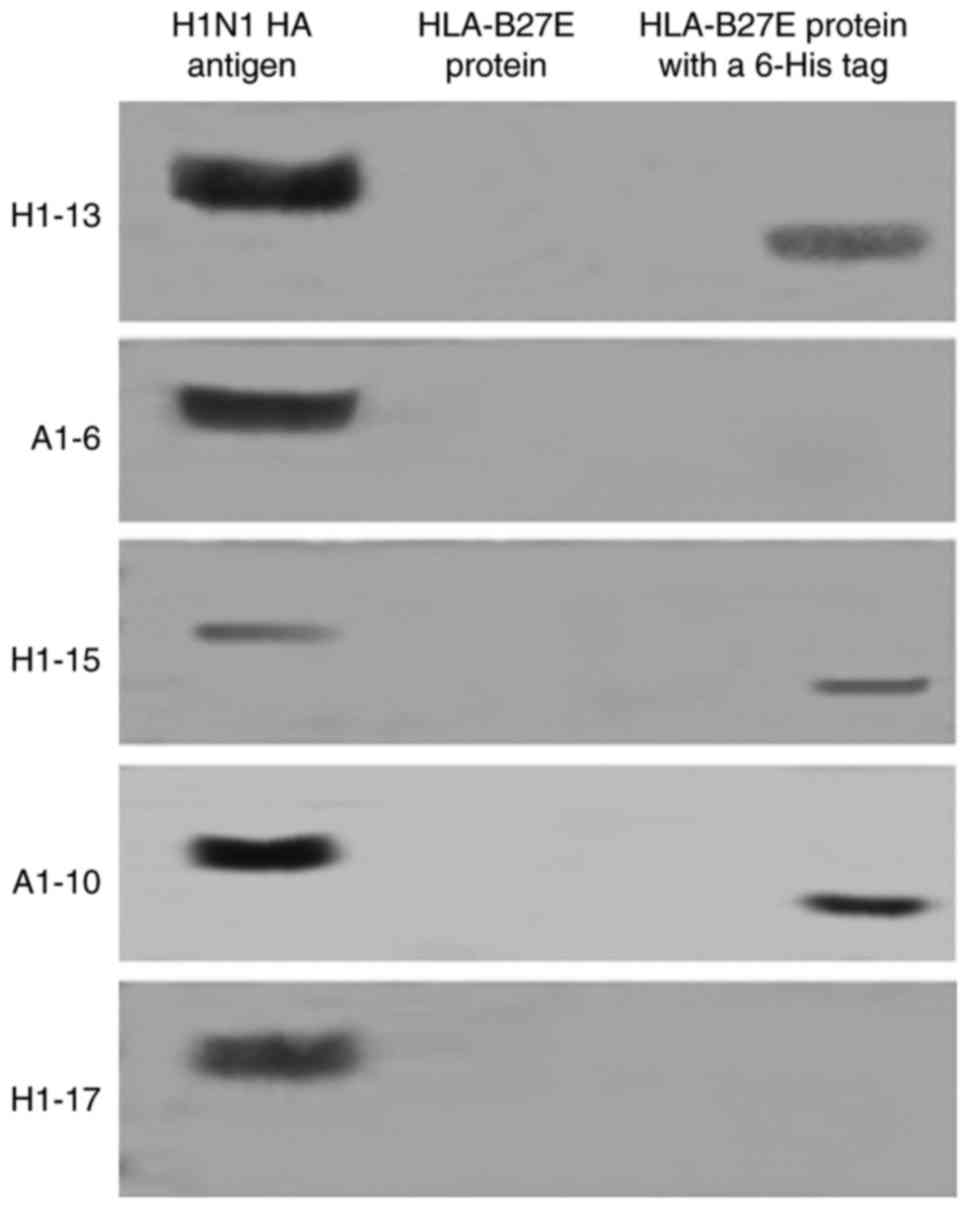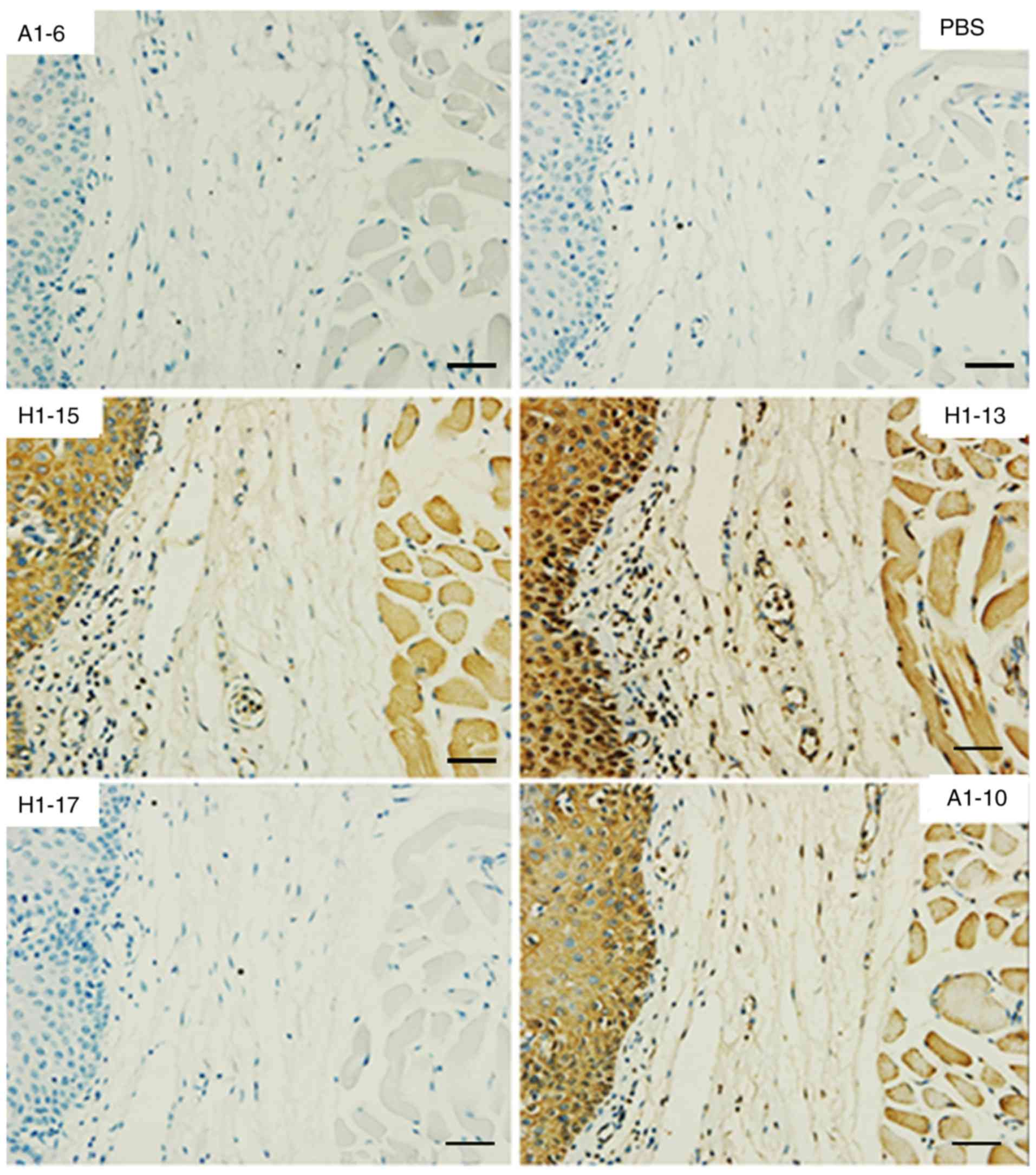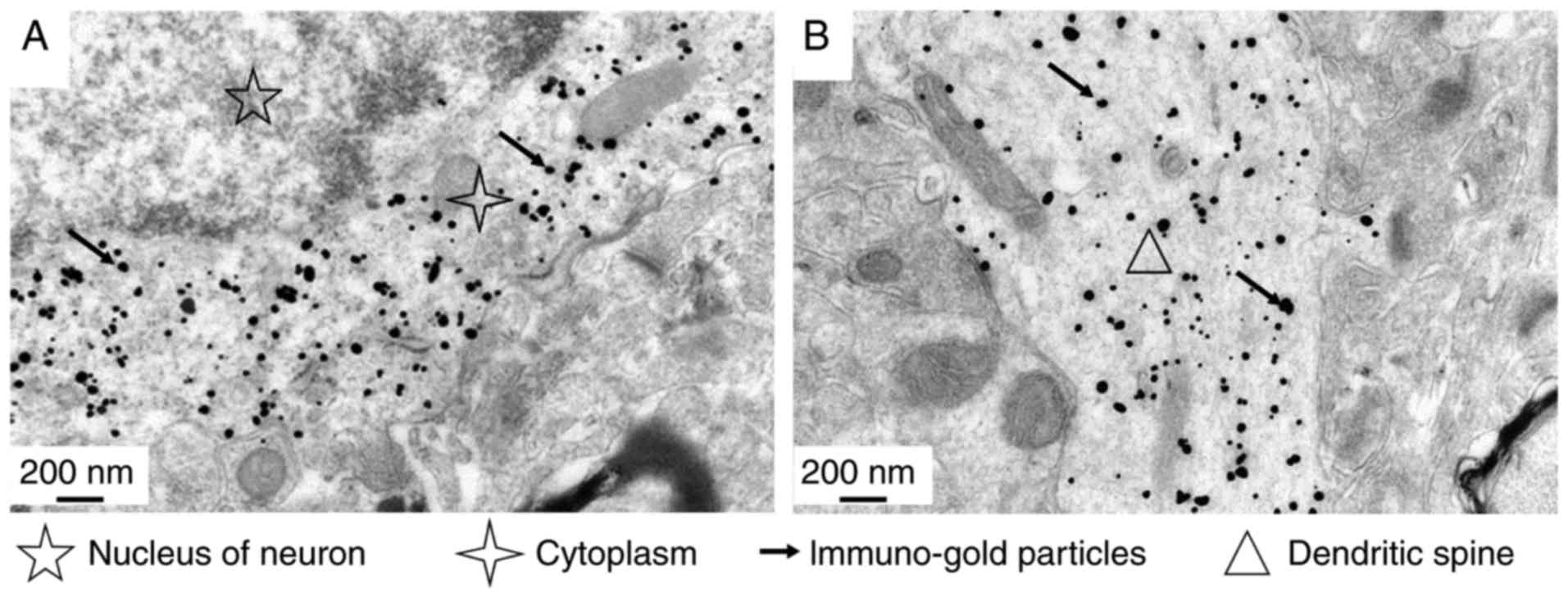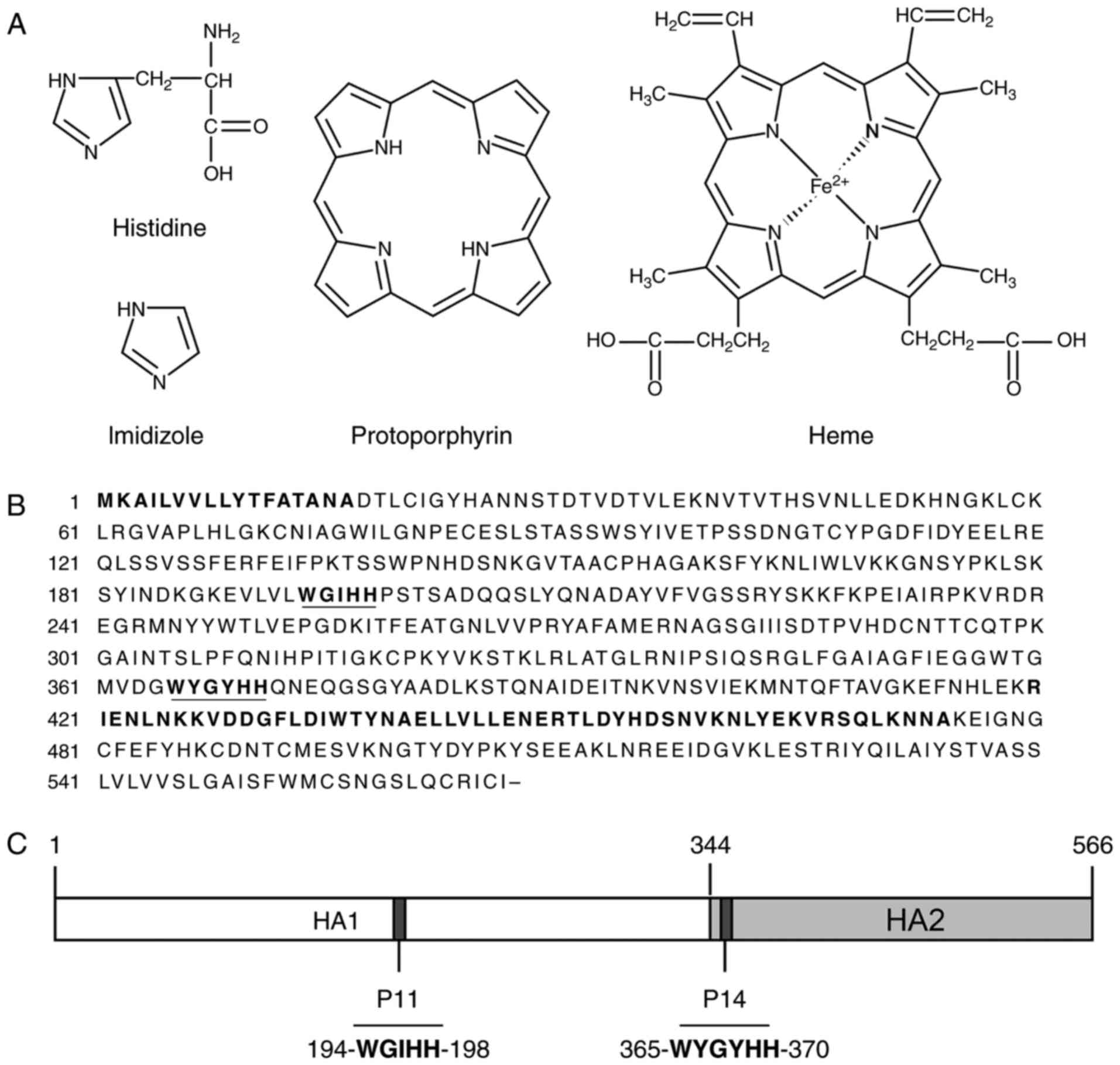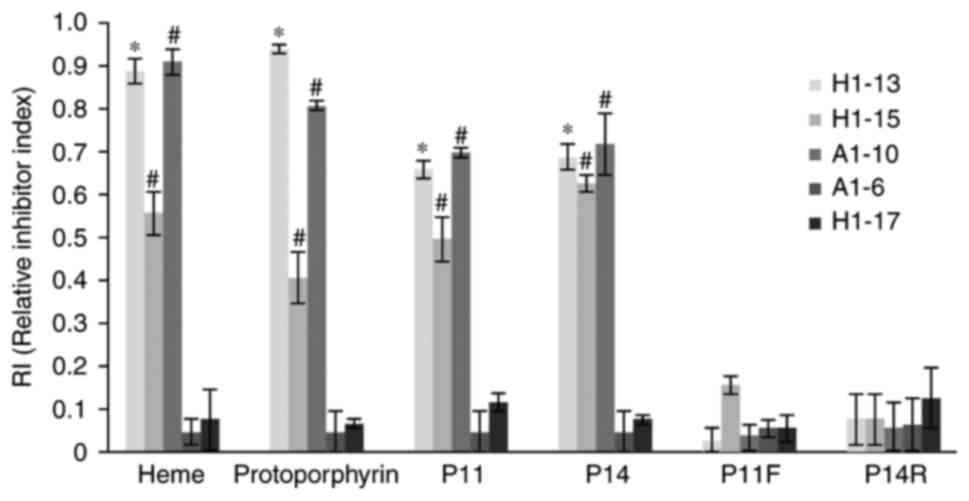|
1
|
Cox NJ and Subbarao K: Influenza. Lancet.
354:1277–1282. 1999. View Article : Google Scholar : PubMed/NCBI
|
|
2
|
Chen GL and Subbarao K: Live attenuated
vaccines for pandemic influenza. Curr Top Microbiol Immunol.
333:109–132. 2009.PubMed/NCBI
|
|
3
|
Thompson WW, Shay DK, Weintraub E, Brammer
L, Cox N, Anderson LJ and Fukuda K: Mortality associated with
influenza and respiratory syncytial virus in the United States.
Jama. 289:179–186. 2003. View Article : Google Scholar : PubMed/NCBI
|
|
4
|
Johnson NP and Mueller J: Updating the
accounts: Global mortality of the 1918–1920 'Spanish' influenza
pandemic. Bull Hist Med. 76:105–115. 2002. View Article : Google Scholar : PubMed/NCBI
|
|
5
|
Tumpey TM, Basler CF, Aguilar PV, Zeng H,
Solórzano A, Swayne DE, Cox NJ, Katz JM, Taubenberger JK, Palese P,
et al: Characterization of the reconstructed 1918 Spanish influenza
pandemic virus. Science. 310:77–80. 2005. View Article : Google Scholar : PubMed/NCBI
|
|
6
|
Santos-Preciado J, Franco-Paredes C,
Hernandez-Flores I, Tellez I, Del Rio C and Tapia-Conyer R: What
have we learned from the novel influenza A (H1N1) pandemic in 2009
for strengthening pandemic influenza preparedness? Arch Med Res.
40:673–676. 2009. View Article : Google Scholar
|
|
7
|
Wiley DC and Skehel JJ: The structure and
function of the hemagglutinin membrane glycoprotein of influenza
virus. Annu Rev Biochem. 56:365–394. 1987. View Article : Google Scholar : PubMed/NCBI
|
|
8
|
Drescher J and Aron R: Influence of the
amino acid differences between the hemagglutinin HA1 domains of
influenza virus H1N1 strains on their reaction with antibody. J Med
Virol. 57:397–404. 1999. View Article : Google Scholar : PubMed/NCBI
|
|
9
|
Evans D, Cauchemez S and Hayden FG:
'Prepandemic' immunization for novel influenza viruses, 'swine flu'
vaccine, Guillain-Barré syndrome, and the detection of rare severe
adversee vents. J Infect Dis. 200:321–328. 2009. View Article : Google Scholar : PubMed/NCBI
|
|
10
|
Nachamkin I, Shadomy SV, Moran AP, Cox N,
Fitzgerald C, Ung H, Corcoran AT, Iskander JK, Schonberger LB and
Chen RT: Anti-ganglioside antibody induction by swine
(A/NJ/1976/H1N1) and other influenza vaccines: Insights into
vaccine-associated Guillain-Barré syndrome. J Infect Dis.
198:226–233. 2008. View
Article : Google Scholar : PubMed/NCBI
|
|
11
|
Israeli E, Agmon-Levin N, Blank M, Chapman
J and Shoenfeld Y: Guillain-Barré syndrome-a classical autoimmune
disease triggered by infection or vaccination. Clin Rev Allergy
Immunol. 42:121–130. 2012. View Article : Google Scholar
|
|
12
|
Simpson BS and Rajabally YA: Sensori-motor
Guillain-Barré syndrome with anti-GD1b antibodies following
influenza A infection. Eur J Neurol. 16:e812009. View Article : Google Scholar
|
|
13
|
Nakamura N, Nokura K, Zettsu T, Koga H,
Tachi M, Terada M, Katoh H, Itoh Y, Osawa H, Ozeki T and Yamamoto
H: Neurologic complications associated with influenza vaccination:
Two adult cases. Intern Med. 42:191–194. 2003. View Article : Google Scholar : PubMed/NCBI
|
|
14
|
Wang DJ, Boltz DA, McElhaney J, McCullers
JA, Webby RJ and Webster RG: No evidence of a link between
influenza vaccines and Guillain-Barre syndrome-associated
antiganglioside antibodies. Influenza Other Respir Viruses.
6:159–166. 2012. View Article : Google Scholar
|
|
15
|
Lei T, Siu KL, Kok KH, Chan KH, Chan EY,
Hung IF, To KK, Li PC, Zhou J, Zheng BJ, et al: Anti-ganglioside
antibodies were not detected in human subjects infected with or
vaccinated against 2009 pandemic influenza A (H1N1) virus. Vaccine.
30:2605–2610. 2012. View Article : Google Scholar : PubMed/NCBI
|
|
16
|
Yuki N, Takahashi Y, Ihara T, Ito S,
Nakajima T, Funakoshi K, Furukawa K, Kobayashi K and Odaka M: Lack
of antibody response to Guillain-Barré syndrome-related
gangliosides in mice and men after novel flu vaccination. J Neurol
Neurosurg Psychiatry. 83:116–117. 2012. View Article : Google Scholar
|
|
17
|
Sencer DJ and Millar JD: Reflections on
the 1976 swine flu vaccination program. Emerg Infect Dis. 12:29–33.
2006. View Article : Google Scholar : PubMed/NCBI
|
|
18
|
Souayah N, Nasar A, Suri MF and Qureshi
AI: Guillain-Barre syndrome after vaccination in United States a
report from the CDC/FDA vaccine adverse event reporting system.
Vaccine. 25:5253–5255. 2007. View Article : Google Scholar : PubMed/NCBI
|
|
19
|
Manicassamy B, Medina RA, Hai R, Tsibane
T, Stertz S, Nistal-Villán E, Palese P, Basler CF and García-Sastre
A: Protection of mice against lethal challenge with 2009 H1N1
influenza A virus by 1918-like and classical swine H1N1 based
vaccines. PLoS Pathog. 6:e10007452010. View Article : Google Scholar : PubMed/NCBI
|
|
20
|
Hanson BJ, Boon AC, Lim AP, Webb A, Ooi EE
and Webby RJ: Passive immunoprophylaxis and therapy with humanized
monoclonal antibody specific for influenza A H5 hemagglutinin in
mice. Respir Res. 7:1262006. View Article : Google Scholar : PubMed/NCBI
|
|
21
|
Lipatov AS, Gitelman AK and Smirnov YuA:
Prevention and treatment of lethal influenza A virus
bronchopneumonia in mice by monoclonal antibody against
haemagglutinin stem region. Acta Virol. 41:337–340. 1997.
|
|
22
|
Stephenson I, Bugarini R, Nicholson KG,
Podda A, Wood JM, Zambon MC and Katz JM: Cross-reactivity to highly
pathogenic avian influenza H5N1 viruses after vaccination with
nonadjuvanted and MF59-adjuvanted influenza A/Duck/Singapore/97
(H5N3) vaccine: A potential priming strategy. J Infect Dis.
191:1210–1215. 2005. View
Article : Google Scholar : PubMed/NCBI
|
|
23
|
Hancock K, Veguilla V, Lu X, Zhong W,
Butler EN, Sun H, Liu F, Dong L, DeVos JR, Gargiullo PM, et al:
Cross-reactive antibody responses to the 2009 pandemic H1N1
influenza virus. N Engl J Med. 361:1945–1952. 2009. View Article : Google Scholar : PubMed/NCBI
|
|
24
|
Krause JC, Tsibane T, Tumpey TM, Huffman
CJ, Basler CF and Crowe JE Jr: A broadly neutralizing human
monoclonal antibody that recognizes a conserved, novel epitope on
the globular head of the influenza H1N1 virus hemagglutinin. J
Virol. 85:10905–10908. 2011. View Article : Google Scholar : PubMed/NCBI
|
|
25
|
Simmons CP, Bernasconi NL, Suguitan AL,
Mills K, Ward JM, Chau NV, Hien TT, Sallusto F, Ha do Q, Farrar J,
et al: Prophylactic and therapeutic efficacy of human monoclonal
antibodies against H5N1 influenza. PLoS Med. 4:e1782007. View Article : Google Scholar : PubMed/NCBI
|
|
26
|
Tan GS, Krammer F, Eggink D, Kongchanagul
A, Moran TM and Palese P: A pan-H1 anti-hemagglutinin monoclonal
antibody with potent broad-spectrum efficacy in vivo. J Virol.
86:6179–6188. 2012. View Article : Google Scholar : PubMed/NCBI
|
|
27
|
Alam S and Sant AJ: Infection with
seasonal influenza virus elicits CD4 T cells specific for
genetically conserved epitopes that can be rapidly mobilized for
protective immunity to pandemic H1N1 influenza virus. J Virol.
85:13310–13321. 2011. View Article : Google Scholar : PubMed/NCBI
|
|
28
|
Clute SC, Watkin LB, Cornberg M, Naumov
YN, Sullivan JL, Luzuriaga K, Welsh RM and Selin LK: Cross-reactive
influenza virus-specific CD8+ T cells contribute to
lymphoproliferation in Epstein-Barr virus-associated infectious
mononucleosis. J Clin Invest. 115:3602–3612. 2005. View Article : Google Scholar : PubMed/NCBI
|
|
29
|
Weinfurter JT, Brunner K, Capuano SV III,
Li C, Broman KW, Kawaoka Y and Friedrich TC: Cross-reactive T cells
are involved in rapid clearance of 2009 pandemic H1N1 influenza
virus in nonhuman primates. PLoS Pathog. 7:e10023812011. View Article : Google Scholar : PubMed/NCBI
|
|
30
|
Yu CI, Gallegos M, Marches F, Zurawski G,
Ramilo O, Garcia-Sastre A, Banchereau J and Palucka AK: Broad
influenza-specific CD8+ T-cell responses in humanized
mice vaccinated with influenza virus vaccines. Blood.
112:3671–3678. 2008. View Article : Google Scholar : PubMed/NCBI
|
|
31
|
Guo C, Xie X, Li H, Zhao P, Zhao X, Sun J,
Wang H, Liu Y and Li Y, Hu Q, Hu J and Li Y: Prediction of common
epitopes on hemagglutinin of the influenza A virus (H1 subtype).
Exp Mol Pathol. 98:79–84. 2015. View Article : Google Scholar
|
|
32
|
Guo CY, Li HJ, Liu Y, Zhao XR, Wang X,
Feng Q, Li Y and Hu J: Preparation and partial characterization of
monoclonal antibodies against HA protein of H1 subtype influenza
virus. Xi Bao Yu Fen Zi Mian Yi Xue Za Zhi. 28:177–180. 2012.In
Chinese. PubMed/NCBI
|
|
33
|
Zhang MJ, Wang MX, Jiang SZ, Xiu ZZ and Ma
WY: Preparation and characterization of the monoclonal antibodies
against Japanese encephalitis virus. Acta Virol. 36:533–540.
1992.PubMed/NCBI
|
|
34
|
Thomson TA, Zhou C, Chu C and Knight B:
Tissue microarray for routine analysis of breast biomarkers in the
clinical laboratory. Am J Clin Pathol. 132:899–905. 2009.
View Article : Google Scholar : PubMed/NCBI
|
|
35
|
Yi H, Leunissen J, Shi G, Gutekunst C and
Hersch S: A novel procedure for pre-embedding double
immunogold-silver labeling at the ultrastructural level. J
Histochem Cytochem. 49:279–284. 2001. View Article : Google Scholar : PubMed/NCBI
|
|
36
|
Hu W: Highly conserved domains in
hemagglutinin of influenza viruses characterizing dual receptor
binding. Natural Science. 2:1005–1014. 2010. View Article : Google Scholar
|
|
37
|
Dutry I, Yen Hl, Lee H, Peiris M and Jaume
M: Antibody-dependent enhancement (ADE) of infection and its
possible role in the pathogenesis of influenza. BMC Proc. 5(Suppl
1): S622011. View Article : Google Scholar
|
|
38
|
Monsalvo AC, Batalle JP, Lopez MF, Krause
JC, Klemenc J, Hernandez JZ, Maskin B, Bugna J, Rubinstein C,
Aguilar L, et al: Severe pandemic 2009 H1N1 influenza disease due
to pathogenic immune complexes. Nat Med. 17:195–199. 2011.
View Article : Google Scholar :
|
|
39
|
Bhatnagar H, Kala S, Sharma L, Jain S, Kim
KS and Pal R: Serum and organ-associated anti-hemoglobin humoral
autoreactivity: Association with anti-Sm responses and
inflammation. Eur J Immunol. 41:537–548. 2011. View Article : Google Scholar : PubMed/NCBI
|
|
40
|
Biagioli M, Pinto M, Cesselli D, Zaninello
M, Lazarevic D, Roncaglia P, Simone R, Vlachouli C, Plessy C,
Bertin N, et al: Unexpected expression of alpha- and beta-globin in
mesencephalic dopaminergic neurons and glial cells. Proc Natl Acad
Sci USA. 106:15454–15459. 2009. View Article : Google Scholar : PubMed/NCBI
|
|
41
|
Ukimura A, Satomi H, Ooi Y and Kanzaki Y:
Myocarditis associated with influenza A H1N1pdm2009. Influenza Res
Treat. 2012:3519792012.
|
|
42
|
Chen AT, Cornberg M, Gras S, Guillonneau
C, Rossjohn J, Trees A, Emonet S, de la Torre JC, Welsh RM and
Selin LK: Loss of anti-viral immunity by infection with a virus
encoding a cross-reactive pathogenic epitope. PLoS Pathog.
8:e10026332012. View Article : Google Scholar : PubMed/NCBI
|
|
43
|
Marazzi I, Ho JS, Kim J, Manicassamy B,
Dewell S, Albrecht RA, Seibert CW, Schaefer U, Jeffrey KL, Prinjha
RK, et al: Suppression of the antiviral response by an influenza
histone mimic. Nature. 483:428–433. 2012. View Article : Google Scholar : PubMed/NCBI
|















